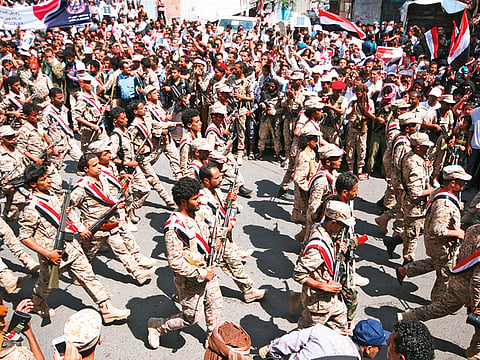Hadi says military solution ‘most likely’
‘Even if you come to an agreement with them, they call up Iran’

DUBAI: Yemen’s civil war will “most likely” require a military solution because of Tehran’s influence, the country’s Saudi-backed President Abd Rabbo Mansour Hadi said on the sidelines of the UN General Assembly.
“The military solution is the most likely because it is not their [Al Houthis’] decision to make,” he said in an interview with Al-Arabiya television broadcast at the weekend, referring to the rebels and their backers, Iran.
“Even if you come to an agreement with them, they call up Iran ... back out, and then you don’t have a deal,” he said.
The American position now is better than it was under [his predecessor Barack] Obama, because Obama’s priority was getting the nuclear deal.”
The interview came just days after the third anniversary of the Al Houthi takeover of Sana’a, which the militants control in coordination with forces loyal to Yemen’s ex-president Ali Abdullah Saleh.
The militants were in March 2015 on the verge of seizing total control of Yemen when Saudi Arabia formed an Arab military coalition and intervened in support of Hadi’s forces.
Hadi, who is based in the Saudi capital Riyadh, said that US policy in the region had improved under President Donald Trump.
“The American position now is better than it was under [his predecessor Barack] Obama, because Obama’s priority was getting the nuclear deal,” which had allowed Iran to “expand” its influence, he said.
Hadi said Obama’s secretary of state John Kerry had proposed he govern with a vice-president chosen by Al Houthis, a proposal he had refused.
In contrast, Hadi said his government was on the same page as the Trump administration with a common goal “to increase pressure on Al Houthis and on Iran”.
Although he largely discounted the negotiations track, Hadi said his internationally-recognised government would “continue to extend its hand to peace”.



